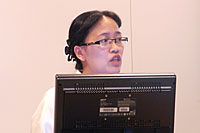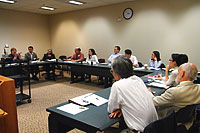Social Integration and Networking
Cultivating Talented Individuals:Support Scheme:Investigative Research Assistance (for student)
LE THANH MAI / Investigation Area: California, America (Presentation at ASPAC 2009)
2009.06.16
Year: Second Year
Name: Le Thanh Mai
Itinerary: 16/6/2009 - 22/6/2009
Destination (Name of city and country)
Research objectives
- to attend and present my paper entitled Child Domestic Work in South East and East Asia: Emerging Regional Cooperation to Combat It at the Asian Studies on the Pacific Coast 43rd Annual Conference from 19th to 21st June, 2009
- to network with professors and scholars who share the same interest in Asian studies and regional integration
Research project
Title: Child Domestic Work in South East and East Asia: Emerging Regional Cooperation to Combat It
Overall goal:Employing a person to undertake domestic household chores is an integral part of Asian tradition. Due to economic and social changes as well as cultural factors, it is widespread to find young children working as child domestic workers (CDWs) in many Asian countries. Behind the home front doors throughout Asia, millions of children are employed to cook and wash, and polish up for those families.
Although the circumstances of exploitation or even child servitude of many of these CDWs have recently been challenged as the outcome of the emerging response to child domestic labour on the global and regional scale, there continues to be a lack of a thorough analysis of the working and living condition of CDWs in many South East and East Asian countries. As a result, there is still a controversial debate over a relevant approach to address child domestic work. Furthermore, no researchers have addressed the necessity and the prospects to develop regional cooperation in combating the violation of the rights of CDWs.
Therefore, the paper will, first, attempt to give an overview of the living and working conditions of CDWs to assess their situation in South East and East Asian countries. The study will then examine the debate among competing approaches, and firmly highlight the need to adopt the multi-faceted approach to deal with child labour in general, and child domestic work in particular. Next, we will discuss the potential contribution of multilateral efforts to address the issue, and to establish a South East and East Asian Community. Finally, after bringing to light emerging regional initiatives and regional cooperation frameworks toward combating child domestic labour in South East and East Asia, the study will identify direction for future actions and cooperation at the regional level to fight against the exploitation and/or abuse found in child domestic labour, and at the same time to improve the working conditions of child domestics so that these children can enjoy their rights, and live in a society that recognizes and respects the rights of the child.
Achievement
My attendance at the Asian Studies on the Pacific Coast 43rd Annual Conference entitled Culture and Environment: Dynamics in Asia-Pacific has made a great contribution to my research project in a number of ways. First, I have been able to participate in one of the panels at the Conference named Border-Crossing Migration, Identities, and Conflicts in Asia: A Multi-Disciplinary (Part A) in which Professor Stuneo Akaha from Monterey Institute of International Studies; Shanawez Hossain, a Ph.D. Candidate from Waseda University; and me made the presentations on our research papers. The main theme of the panel is the promotion of regional cooperation for the sake of human security in the Asian Pacific region. To this end, Professor Akaha's paper on International Migration and Human Security in East Asia: The Case for a Regional Approach examines the issue of human security related to labour migration and human trafficking in East Asia, and regional efforts against the human security problem. And he rightfully concludes that a multilateral regional cooperation is one of the most effective ways to translate global norms into national practices because regional consultation and coordination processes can reflect both the developments in norm building at the global level and the realities on the ground. Also, he argues that regional cooperation is essential to ensure the consistent and coherent application of relevant global rules and principles in Asia. Shanawez Hossain in his paper entitled Regional Integration to Address Poverty and Human Security in Asia: An Assessment from Human Rights and Development Cooperation Perspective attempts to assess the linkage of development, human rights and human security, and highlights how Asian regional integration may create opportunities for regional and international development cooperation that infuses a human rights-based approach by a case study of international poverty reduction cooperation projects in Bangladesh, one of the poorest countries in South Asia. Along this line, my paper on Child Domestic Work in South East and East Asia: Emerging Regional Cooperation to Combat It, first, aims to give an overview of the living and working conditions of CDWs to assess their situation in South East and East Asian countries. The study then firmly highlights the need for the development and consolidation of a more differentiated approach to child domestic labour and child labour as a whole which is emerging as a convergence point out of different strands of thought. Next, I discuss the potential contribution of multilateral efforts to address the issue adopting the multi-faceted approach, and to establish a South East and East Asian Community to combat child labour based on the common norms and principles, namely, the best interest of the child and participation right. Finally, after bringing to light emerging regional initiatives and regional cooperation frameworks toward combating child domestic labour in South East and East Asia, the study identifies direction for future actions and cooperation at the regional level to fight against the exploitation and/or abuse found in child domestic labour, and to protect and promote the rights of the child; contributing to the establishment of a common platform of 'human rights governance', and thus a framework for Asian cooperation and integration in the region. In fact, the Panel has received very constructive observations and generous complements from participants at the Conference.
Second, the Conference with 23 panels covering a variety of subjects related to the re-conceptualization and re-construction of the boundaries of the Asia-Pacific in an era of globalization has offered a very good opportunity for me to broaden my knowledge about Asia's cultures and societies in relation to the environment at various historical junctures. And I am particularly interested in a presentation on The Death of Eugenia Baja: Feminicide and Transnational Feminist Organizing among Filipina Migrant Workers by Stephanie Santos, a Ph.D. Student from Asian American Studies, UCLA as her research area is to some extent similar to mine when she looks at the working and living conditions of migrant domestic workers from the Philippines. It is very interesting to see her using feminicide as a framework to highlight both the institutional inequalities that exposed Filipina migrant female domestics to violence, and to learn about the potential role of transnational feminist organizations in empowering these women.
Last but not least, the Conference has provided me with a valuable chance to network with renowned professors and talented scholars from different countries interested on the same themes. The open discussions and exchanges of ideas in the Q & A sections, the informal meetings at coffee breaks, lunch time, banquets and cultural shows have helped build up a long-term academic network and valuable friendship among us.
Confirmed by person in charge of project promotion
Report
Photo




